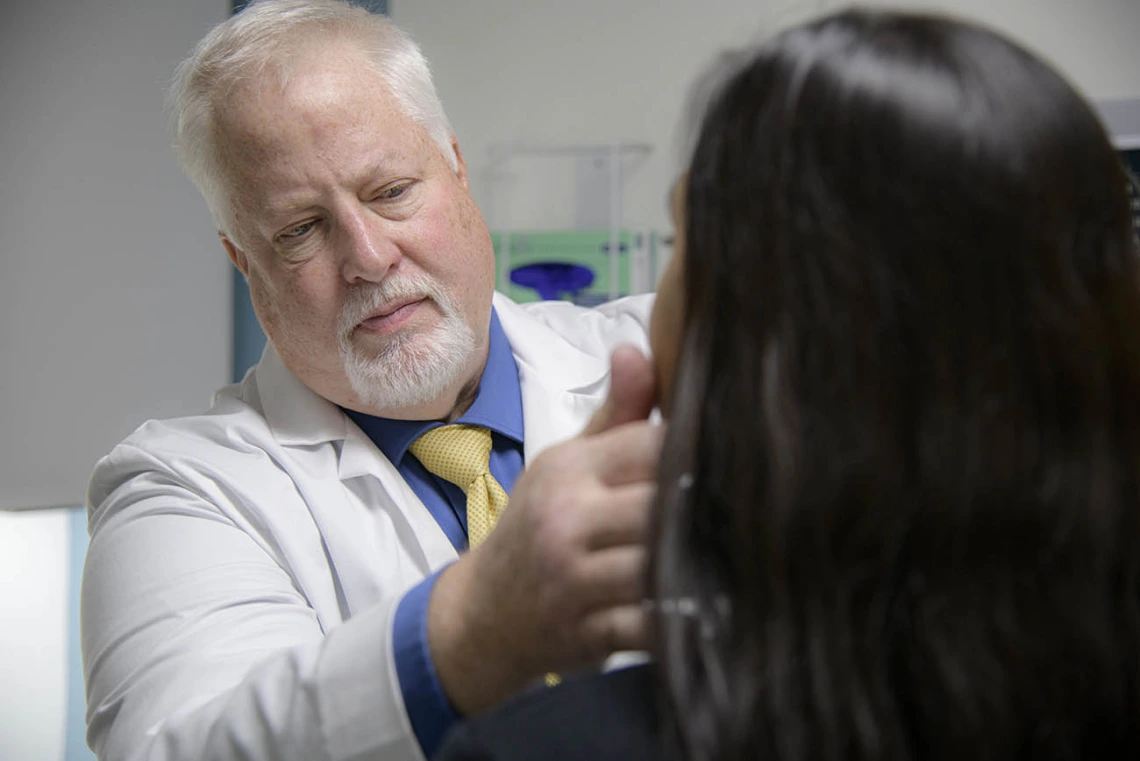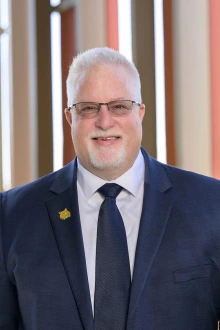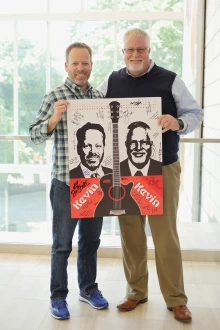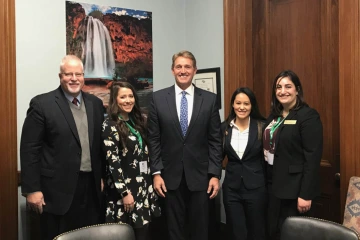On a mission to lead the next class of physician assistants
Kevin Lohenry’s military experience guided him toward a career as a physician assistant and is helping him prepare the next generation of health care providers.

After serving in the Navy, Kevin Lohenry, PhD, PA-C, embarked on a career as a physician assistant and now is leading others to the profession as interim dean of the University of Arizona College of Health Sciences.
When Kevin Lohenry, PhD, PA-C, first tried higher education as a student, it did not work out. Aimless and dispirited, he left school and took his father’s advice to join the Navy. He did not realize it at the time, but Lohenry was setting sail on a course that would lead him to a career as a physician assistant and educator at the University of Arizona Health Sciences.

Kevin Lohenry, PhD, PA-C, is Interim Dean of the newly approved University of Arizona College of Health Sciences.
After enlisting in 1986, Lohenry worked as a Naval Hospital Corpsman where he was surrounded by medical professionals including physician assistants. He was quickly drawn to the profession.
“I was stationed near Boston in 1987, and I met the first PAs I’d ever known,” said Lohenry, who is interim dean of the UArizona College of Health Sciences and assistant vice president of interprofessional education for UArizona Health Sciences. “There was just something about the way they took care of patients. From that point on, I was excited about becoming a PA.”
Rooted in the military
The PA profession was rooted in the military’s approach to medicine — born out of necessity and inspired by military pragmatism.
Eugene A. Stead Jr., MD, of Duke University Medical Center, organized the first class of PAs in 1965 in response to a nationwide shortage of primary care physicians. He modeled the program after the World War II-era program for fast-tracking medical students to become doctors and recruited Navy Hospital Corpsmen with extensive medical training as the first students. The inaugural class graduated in 1967.
The medical community backed the profession by setting accreditation standards and establishing a national certification process with standardized exams, as well as continuing medical education requirements.
Over the next half century, physician assistants gained prominence. Just three years after the American Association of Physician Assistants was incorporated, the American Medical Association formally recognized the profession. In 1973, the first national PA-certifying exam was administered by the National Board of Medical Examiners. By 1992, PAs were commissioned in every military branch.
PAs continued to advance into the mainstream of health care at the turn of the century. In 1997, Medicare covered PA providers in all settings, and by 2000, all states authorized the PA practice. The profession made another breakthrough in 2007, when PAs received prescriptive authority in all 50 states and the District of Columbia.
From war veteran to white coat

Kevin Lohenry, PhD, PA-C, third from left, became interested in becoming a PA while in the military, where he was part of the Helicopter Combat Support Squadron Five based in Point Mugu, California. The U.S. Navy Search and Rescue Special Operations support unit served in Operations Desert Shield and Desert Storm.
One of the PAs who led Lohenry to the profession was Dennis Aucoin, an early graduate of the PA program at Duke University. Aucoin was a chief warrant officer and PA at the Branch Medical Clinic for Naval Air Station South Weymouth in Massachusetts.
“He was a provider in the clinic where I served as a Navy Corpsman. His mentorship as a Navy professional and his care of the patients that were entrusted to see him were the two main reasons the PA profession became a viable option for me,” Lohenry said.
Lohenry started taking night courses while stationed at Naval Air Station Point Mugu, near Oxnard, California. After completing seven years of service in the Navy in 1993, he enrolled in the PA program at Midwestern University, graduated in 1996, then practiced internal medicine for 10 years before transitioning to family medicine.
Lohenry went on to become program director of Midwestern’s PA program, then served as associate dean for graduate student affairs at the University of Southern California Keck School of Medicine, where he was also program director for the Primary Care Physician Assistant Program.

The Schuers, a band including Kevin Schuer, DrPH, PA-C, and Lohenry (right), performed at a meeting of the PA Education Association. Both men were on the organization’s board of directors, and other board members had some fun by signing the band’s poster.
While working at USC, Lohenry recognized a need for health care in the homeless community and spearheaded a street medicine program. Sae Byul (Sarah) Ma, PharmD, director of accreditation for the UArizona Health Sciences Physician Assistant program, worked under Lohenry at USC and valued his professional approach.
“Kevin Lohenry was an exceptional boss who not only possessed impressive leadership skills, but also inspired and empowered the entire team,” Ma said. “He fostered a culture of open communication, respect and shared goals created an environment where everyone's strengths were valued and utilized.”
Over the years, Lohenry has had a knack for being in the right place at the right time. He says that tendency has sometimes made him feel like Forrest Gump, the wide-eyed character played by Tom Hanks in the 1994 film of the same name. Gump had the uncanny ability to step into critical moments of American history.
For Lohenry, that luck led him to meet the woman of his dreams – his wife Dana – and celebrities including Paul McCartney. A keyboardist and guitarist in his spare time, he once played in a band that opened for country music star Travis Tritt. But his good fortune also positioned him to help three people, one of which was his father, when each was choking on food.
“There was nobody else there to help,” Lohenry said. “I was trained and, luckily, the technique I use worked, and they all survived.”
A drive for diversity
More than 3.3 million Arizonans live in Health Professionals Shortage Areas, defined by the Health Resources and Service Administration as geographic areas with a shortage of providers for an entire group of people. According to the U.S. Department of Health and Human Services, Arizona needs more than 650 primary care physicians to meet the health care needs of its residents.
The shortage of health care workers makes it tough for patients to get the care they need, and more PAs could help make up for the shortfall, Lohenry says.

(From left) While working at the University of Southern California, Lohenry, along with Amber Price, MPAP, PA-C, Sen. Jeff Flake, Rebecca Fleming, MPAP-PA-C, and Shirin Heydari, MPAP-PA-C, visited Washington, D.C., to advocate for Title VII federal funding for PA students.
At the same time, the PA profession has been a homogeneous group, he says, both economically and ethnically. According to the National Commission on Certification of Physician Assistants, only 6.5% of PAs are Hispanic, while nearly one-third of Arizona residents are Hispanic.
Lohenry is building the PA program at the College of Health Sciences to focus on educating the next generation of health care professionals to provide compassionate and culturally sensitive care for all.
“When health care professionals only come from more affluent experiences, they tend to lack understanding of the culture and the nature of the needs of communities they serve,” Lohenry said adding that he hopes to create a diverse group of students that will reflect the rich diversity of Arizona’s residents.
To accomplish that goal, Lohenry seeks to inspire a new generation of PAs.
“The conversation at high schools or grade schools is about becoming a doctor or becoming a nurse or becoming a lawyer,” Lohenry said. “We need to share the beauty of the PA profession with these students and allow them to dream of something different.”
Our Experts
Kevin Lohenry, PhD, PA-C
Interim Dean, UArizona College of Health Sciences
Assistant Vice President of Interprofessional Education, UArizona Health Sciences
Clinical Professor, Department of Medicine, College of Medicine – Tucson
Sarah Ma, PharmD
Physician Assistant Program Director of Accreditation, UArizona College of Health Sciences
Contact
Phil Villarreal
Health Sciences Office of Communications
520-403-1986
pvillarreal@arizona.edu

